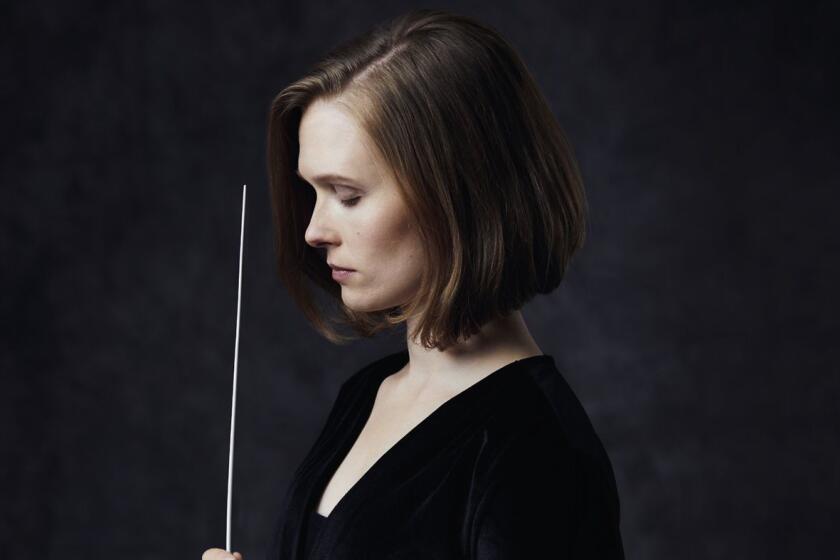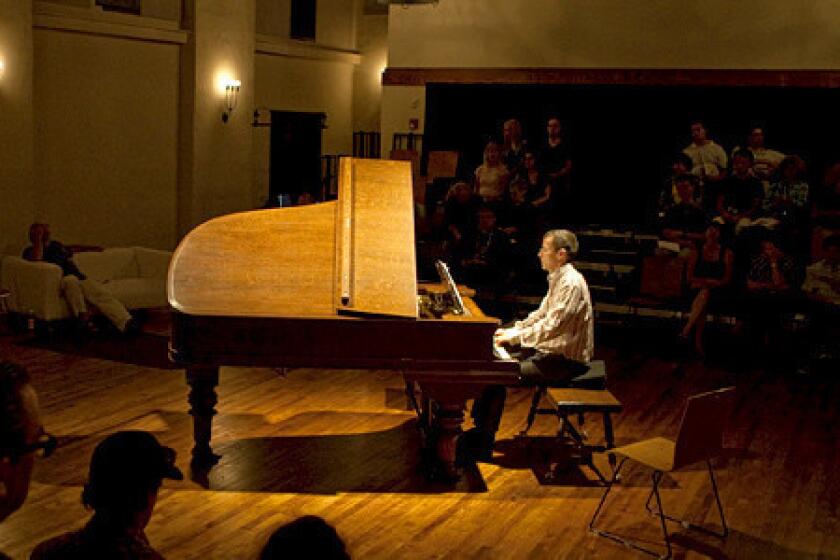Commentary: As U.S. orchestras cancel, Europe’s reopen. Mirga and Zubin lead the way
- Share via
Summer, when it comes to the performing arts in America, was already over by mid-spring. All major festivals and nearly all events had been canceled. Last week brought depressing daily reports of fall closures.
In New York, there will be no business for the rest of the year at Carnegie Hall or Lincoln Center. Esa-Pekka Salonen will not get to begin his first season as music director of the San Francisco Symphony until next year, and there won’t be opera across the street before April at the earliest. The stories are similar in Chicago and at Kennedy Center in Washington, D.C. Center Theater Group has canceled productions until April, and other companies across most of the country may well follow if they haven’t already made the move.
So just what kind of alternate universe was it that allowed me to click on my computer and watch Mirga Grazinyte-Tyla recently conduct a concert in Dortmund, Germany? Or watch the 84-year-old Zubin Mehta — having only a couple days earlier flown to Florence, Italy, from his home in Brentwood — on Wednesday conduct the opening concert of the Maggio Musicale Fiorentino festival?
A full-sized Vienna Philharmonic is back in business in its golden Musikverein. On Sunday, Riccardo Muti inaugurated the 30th anniversary of his Ravenna Festival in Italy with a Mozart orchestral program. Running through the end of July, that festival will have more than 40 events, including orchestral concerts, chamber music, solo recitals and theatrical events. A Handel oratorio with vocal soloists and chorus is promised.
That’s nothing compared to the Salzburg Festival, which will be up and running all August. Reduced, for sure, from its initially ambitious 100th anniversary lineup, the Austrian festival will nonetheless feature orchestra concerts, two full opera productions and a host of chamber music and solo recital programs. The lineup is typically Salzburg starry, Gustavo Dudamel included, conducting the Vienna Philharmonic.
Britain remains wary. So does France, so far. But Spain — like Italy, another coronavirus hot spot — is gingerly experimenting with live concerts. Prague too. In Asia, Seoul never fully closed down all its theaters.
Having lived virtually for three months, I approached this early opening-up on the other side of the pond with skepticism. Germany and Austria, in particular, have obviously managed the pandemic far more successfully than we have, but even so, risk remains.
Nor could I see the appeal. There were any number of necessary precautions. All venues have elaborate instructions about entering and exiting, limiting contact. Temperature is taken. Concerts are typically an hour and never more than 90 minutes. No intermission. No amenities. Seats are blocked off to keep you away from others. Masks are required coming and going but can come off during the performance.
Although there have been amusing ways of dealing with the sad sight of a barren hall, such as placing manikins or potted plants in empty seats, it all feels very uptight. The programs, thus far, have been conventional. There is an elitism over who will get seats. The social aspects of a concert are not permissible. Traveling to festivals, staying in hotels and all the rest —the process is not only full of risk but also requires unpleasant regimenting.
Moreover, watching concerts with distanced players streamed from theaters without audiences, as the Berlin Philharmonic has been doing, is also dispiriting. What are we to do other than wait for the real thing to return?
But, wait. Mirga and Mehta proved the real, and astonishingly stirring, thing.
Some of that had to do with the moment, which was genuinely moving. Much of it, however, had to do with seeing two conductors close to Angelenos’ hearts. The Los Angeles Philharmonic launched one of the world’s great conducting careers when Mehta became music director in 1962 at the tender age of 26. Exactly 50 years later and at the same age, Grazinyte-Tyla began as a Dudamel fellow of the orchestra, and nothing could be clearer than her Dortmund concert on June 7 that hers will surely be one of the world’s great conducting careers as well.
First off, neither conductor looked as expected. Grazinyte-Tyla, who happens to be eight months’ pregnant with her second child, now sports a boyish haircut almost identical to that of Salonen in 1992 when he became music director of the L.A. Phil at age 34. She might as well have been his twin.
Mirga Grazinyte-Tyla’s first major recording contains two symphonies by Mieczyslaw Weinberg, aka Moisey Samuilovich Vaynberg, as the Polish-born Jewish composer was called in Russia.
The main thing, though, was that this terrific concert, which can be viewed for a fee on the German classical music site takt1.com, didn’t seem uptight at all. The Konzerthaus Dortmund began streaming live chamber music without an audience on March 15 and seems to have its act very much together.
Concert halls in Berlin are still closed to audiences, however, so members of the Konzerthausorchester Berlin took the train (a 3½-hour journey). Players had to be tested for the novel coronavirus and wore masks coming and going from the stage. Brass and winds (there weren’t many) were seated far in the back and behind plastic shields to protect the strings from spray.
Grazinyte-Tyla, who is music director of the City of Birmingham Symphony Orchestra, was asked to substitute for the orchestra’s music director, Christoph Eschenbach, who wasn’t able to leave his Paris apartment and at age 80 is at higher risk. Grazinyte-Tyla tested positive for COVID-19 in March and recovered.
The program began with a darkly soulful piece for strings, “De Profundis,” by Grazinyte-Tyla’s fellow Lithuanian, Raminta Serksynte, that suited these intense times. The spirited young cellist Kian Soltani was the intensely lyrical soloist in Haydn’s First Cello Concerto. Grazinyte-Tyla concluded with a tightly organized performance of Beethoven’s Fourth Symphony with fervor felt in every bar.
Mehta also has changed. When last seen at the beginning of the year leading the L.A. Phil in magisterial performances of Mahler’s Second Symphony, he still appeared frail after cancer treatments and hip surgery. But Wednesday, he was much more his robust old self. He’s put some weight back on, and he walked with a renewed stateliness without assistance or a cane.
This concert was broadcast live and only archived for 24 hours via the streaming service Idagio, but Mehta has more concerts in the Maggio Musicale festival, which also will include programs led by Valery Gergiev and Daniele Gatti. Tickets can be purchased to watch them online.
Given the terrible outbreak of the coronavirus in Italy, the festival was given the green light only five days earlier, and the sense of being back was palpable even on a computer screen. A little too palpable for my taste. A full-size and excellent festival orchestra was not distanced, although the brass and winds did sit apart and behind shields. Unlike Grazinyte-Tyla, Mehta walked onstage through the orchestra. He shook hands with his soloist, violinist Leonidas Kavakos, and had to stop himself from touching orchestra players. Old habits die hard.
Again, this was an exceptional concert. Mehta led a taut performance of Schubert’s “Tragic” Symphony, and Kavakos gave a gripping account of Berg’s Violin Concerto. Both pieces met the need for acknowledging anguish with a renewed, but somber, vigor. For this occasion, the audience was kept to around 100.
Whether these were merely special, unrepeatable events or indicators of a new concertgoing momentum remains to be seen. Crowd size is expected to grow quickly. The Arena di Verona this summer will stage opera galas, a recital by Plácido Domingo and Puccini’s “Gianni Schicchi,” allowing a maximum audience of 1,000 in its 15,000-seat ancient Roman amphitheater.
One super-spreader concert, however, could shut everything down everywhere. Then again, things may go just fine, and a fall season of some sort will be possible in some places.
But not here. Even if we had the testing, tracing and collective social behavior necessary to control the pandemic, we’d lack another crucial factor. Germany and Austria are among the countries that consider artists to be essential workers and that have a long tradition of government support of the arts. In America, there is a deadly economic risk along with the health concerns. Our performing arts institutions can’t possibly stay afloat with halls filled to a fraction of capacity. Pray for a vaccine.
Erik Satie has emerged as the composer of our pandemic/protest times, the soundtrack both for chilling out at home and for channeling psychic dread.
More to Read
The biggest entertainment stories
Get our big stories about Hollywood, film, television, music, arts, culture and more right in your inbox as soon as they publish.
You may occasionally receive promotional content from the Los Angeles Times.













